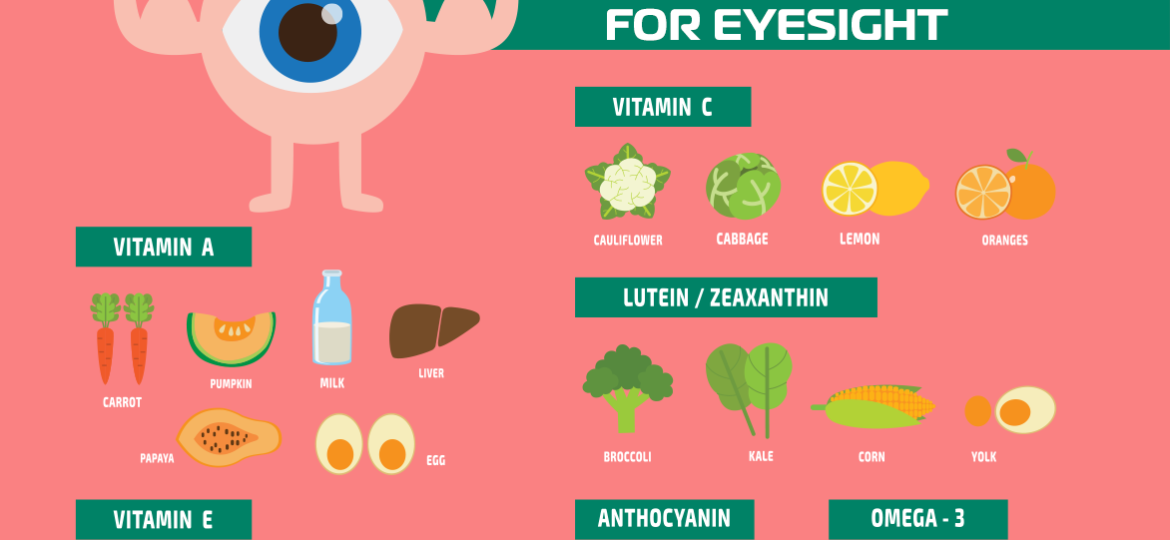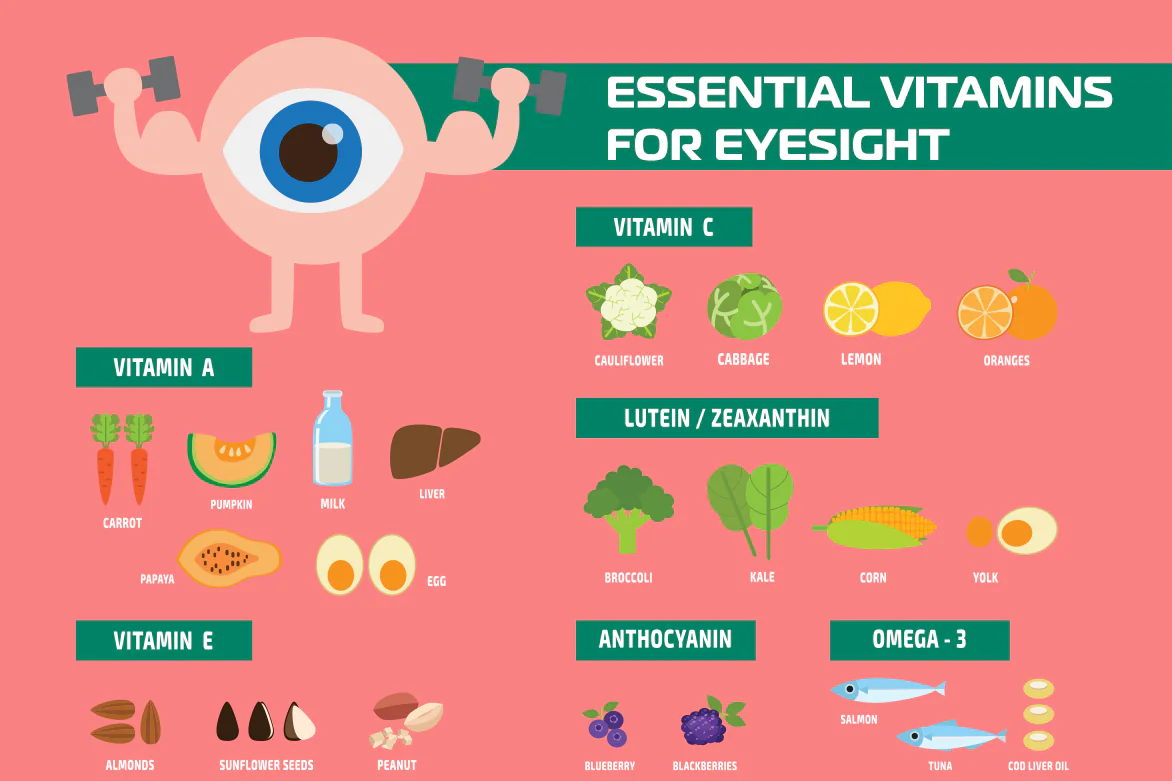
9 Essential Vitamins For Eyesight

In the fast-paced world we live in, our eyes work tirelessly to navigate the constant stream of information and experiences. Taking care of our eyesight is crucial to maintain a high quality of life, and one key way to do it is through intaking proper nutrition. Our eyes, like the rest of our body, benefit from a range of vitamins for eyesight that play a vital role in maintaining optimal eye health. In this blog, we’ll explore nine essential eye vitamins that contribute to the well-being of our eyes, shedding light on how these nutrients can be incorporated into our diets for a clear, sharp, and healthy vision.
Why Are Vitamins Important for Eyesight?
Eye vitamins contribute to the protection of our eyes from harmful elements, such as UV rays and oxidative stress. Additionally, it promotes proper functioning of its different components, including the cornea, lens, and retina.
Protection from Harmful Elements: Vitamins act as shields against UV rays and oxidative stress, reducing the risk of conditions like cataracts and age-related macular degeneration.
Optimal Functioning: These nutrients maintain proper functioning of eye elements.
Long-term Well-being: Vitamins for eyesight enable us to make informed dietary choices, contributing to the long-term well-being and clarity of our vision.
Best Vitamins for Eyesight
Essential vitamins that are good for eyesight include Vitamin A for retinal health, Vitamin C and E as antioxidants, Vitamin D to reduce macular degeneration risk, B-complex for preventing eye conditions, Omega-3 fatty acids for retinal support, Lutein and Zeaxanthin for protection against light. Intaking these nutrients into your diet supports overall eye health and prevents various eye conditions.
Significance of Vitamin A for Eyesight
Vitamin A plays a key role in maintaining the health of the retina, essential for low-light and color vision. It contributes to the formation of light-sensitive pigments in the eyes, aiding in visual perception. Additionally, it prevents night blindness and supports a healthy cornea. Found in foods like carrots, sweet potatoes, spinach, and liver. Including them into your diet promotes optimal eye health, supporting the intricate processes that enable us to see clearly. Its significance lies in safeguarding overall eye function and reducing the risk of conditions related to vision impairment.
Contribution of Vitamin C in Improving Eyesight
Vitamin C contributes significantly to improving eyesight by acting as an antioxidant that protects the eyes from oxidative damage. This essential vitamin supports overall eye health, reducing the risk of age-related macular degeneration and cataracts. Found abundantly in citrus fruits, strawberries, bell peppers, and broccoli. Incorporating these foods into your diet can help you combat free radicals, promoting healthy cells in the eyes and contributing to clearer vision.
You can also read about आंखों की रोशनी बढ़ाने के लिए एक्सरसाइज
Best Vitamins for Eyes: Vitamin E
Vitamin E acts as a potent antioxidant, protecting the eyes from oxidative stress and promoting overall eye health. Its contributions include preventing age-related macular degeneration and reducing the risk of cataracts. Nuts, seeds, vegetable oils, and leafy greens are excellent sources of Vitamin E, making them easy to incorporate into your diet. It maintains healthy cells in the eyes and preserves visual acuity. By consuming Vitamin E-rich foods regularly reduces the likelihood of vision-related issues, ensuring optimal eye function for years to come.
Key Benefits of Vitamin D in Eyesight
Vitamin D plays a crucial role in eyesight by reducing the risk of age-related macular degeneration and supporting the health of the retina. Sunlight exposure is a natural source of Vitamin D, and it can also be obtained from fatty fish, fortified dairy products, and egg yolks. The significance of Vitamin D in eyesight lies in its ability to enhance corneal epithelial barrier function, ensure visual health and contribute to overall well-being
Best Eye Vitamins for Blurry Vision: Vitamin K
Vitamin K, while not as directly associated as some other vitamins for eyesight, contributes to eye health by supporting blood clotting, which is crucial for the vascular system supplying the eyes. Adequate Vitamin K intake may help prevent retinal bleeding and maintain optimal blood flow to the eyes. Leafy greens like kale and spinach, broccoli, and Brussels sprouts are excellent sources of Vitamin K. The significance of Vitamin K lies in its indirect support of overall eye health through its role in maintaining a well-functioning vascular system for the eyes.
Also, Read about What is Vision Correction?
Are B Vitamins Essential for Eyesight?
Yes, B vitamins for eyesight, including B6, B9 (folate), and B12, are essential for eyesight. Vitamin B6 aids in preventing eye conditions and maintaining nerve function in the eyes. Folate supports the synthesis of DNA and RNA, crucial for healthy cell division in the eyes. Foods rich in these B vitamins include leafy greens, legumes, nuts, seeds, and animal products like fish and meat. Their significance lies in promoting cell health, preventing vision-related conditions, and supporting the optimal functioning of the eyes.
Foods Rich in Lutein and Zeaxanthin
Lutein and Zeaxanthin are one of the best vitamins for eyesight as they act as potent antioxidants, protecting the eyes from harmful high-energy light waves. They contribute significantly to reducing the risk of cataracts. Foods rich in these compounds include leafy greens like spinach and kale, broccoli, peas, and eggs. The significance of incorporating Lutein and Zeaxanthin into your diet lies in their ability to accumulate in the retina, providing a natural defense against oxidative stress and promoting long-term visual well-being.
Omega-3 Fatty Acids for Improve Eyesight
Omega-3 fatty acids play a crucial role in improving eyesight by supporting the structure of the retina and potentially preventing conditions like dry eyes. These essential fats contribute to the production of protective eye fluids. Fatty fish such as salmon, mackerel, and trout, as well as flaxseeds and walnuts, are rich sources of Omega-3s. Incorporating these fatty acids into your diet enhances visual function and reduces the risk of age-related vision problems. Including Omega-3-rich foods supports the maintenance of eye moisture, optimal retinal function, and contributes to long-term eye health for clearer and sharper vision.
Do you love your eyes? Here are some amazing tips for eye care during pollution.
Zinc: A Crucial Element for Eyes
Zinc is a crucial element for maintaining the health of the retina, cell membranes, and protein structure of the eye. This essential mineral supports the transportation of Vitamin A from the liver to the retina, aiding in the production of melanin, a protective pigment. Foods rich in zinc include oysters, beef, poultry, and dairy products. The significance of adequate zinc intake lies in its pivotal role in preserving visual acuity, promoting night vision, and supporting the prevention of various eye conditions.
Conclusion: We have read all about the best eye vitamins in this blog. In summary, essential vitamins like A, C, D, and B, along with nutrients such as Lutein, Zeaxanthin, Omega-3s, and Zinc, play vital roles in maintaining eye health. Incorporating foods like leafy greens, fatty fish, and nuts ensures optimal vision and prevents age-related issues. Intaking these vitamins in our diet is a simple yet effective way to care for our eyes and promote long-term visual well-being.
To know more about Eye Care Tips for Optimal Vision! Check out this blog
FAQs
Can vitamins really help improve my eyesight, or is it just for maintaining eye health?
Vitamins play a crucial role in maintaining eye health and can contribute to preventing issues, but they may not reverse existing conditions.
Are vitamins helpful in improving eye health?
Yes, vitamins are essential for promoting eye health by supporting various functions, preventing conditions, and maintaining optimal vision.
Here are some of the Frequently asked questions about eye health is answered.
What is the best vitamin for eyesight?
The best eye vitamin is Vitamin A, as it plays a crucial role in maintaining overall eye health, including vision.
Can eye vitamins improve vision?
While they may not enhance vision dramatically, a balanced intake of eye vitamins for blurry vision can contribute to clearer and sharper vision over time.
Wonder how you can take care of your eyes naturally check out our blog on Natural Eye care Tips.
Can I take supplements instead of relying on dietary sources for these vitamins?
Supplements can be an option, but it’s generally recommended to obtain nutrients from a varied diet for overall health benefits.
You can check out Best Foods to Improve Eyesight blog to gain more insights
How soon can I expect to see improvements in my eyesight with a balanced diet?
The timeline varies, but consistent intake of eye-friendly nutrients through a balanced diet may lead to gradual improvements over weeks to months.
How can I incorporate these eye vitamins into my diet?
Include foods like leafy greens, fish, nuts, and colorful fruits and vegetables regularly to intake of essential eye vitamins for blurry vision.
What are the essential vitamins for eyesight?
Essential vitamins for eyesight include A, C, E, D, B-complex, and specific nutrients like Omega-3s, Lutein, Zeaxanthin, and Zinc.
What vitamin deficiency causes blurry vision?
Vitamin B12 Deficiency can lead to optic neuropathy, which can cause blurry or distorted vision.
